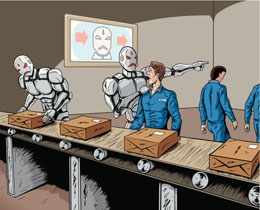Technological disruptions demand that business and HR leaders stay abreast of technological advancements to avoid technological unemployment.
Technological disruptions are here to stay, but whether they will replace humans or empower them to be more analytical and accurate, is an ongoing debate. While technology is making inroads into various jobs, studies have shown that it is already transforming the way businesses function. With intelligent technologies, such as chatbots, smart software and cloud computing, a lot of jobs either fear getting outdated or will have to re-innovate the way people function in certain roles, such that these technologies do not make the jobs obsolete but help people perform better.
Boston Consulting Group predicts that by 2025, up to a quarter of jobs will be replaced by either smart software or robots. A study by Oxford University suggests that 35 per cent of existing UK jobs are at risk of automation in the next 20 years. The jobs that demand lower skill levels are the most vulnerable. This implies that professionals seeking job security in this disruptive world will have to continuously reskill and upskill themselves. This also means that organisations will have to regularly assess and develop people in terms of the knowledge of the desired technological tools.
“While keeping up with technology is imperative in today’s business environment, corporates must ensure that this does not replace human interaction. The ideal scenario would be when we can bring both these together to a harmonious balance to achieve the organisational objectives.”
According to the latest Randstad Workmonitor Survey, that interviewed over 600 employees in the age group of 18–65 in India, 95 per cent of the survey respondents agreed that today, technology and digitalisation have a major impact on their jobs. 96 per cent said that they see this trend as an opportunity—an almost equivalent number of male and female respondents mentioned this. Remarkably, 89 per cent indicated that they need more training to keep up with technological developments and make them work to their advantage.
Moorthy K Uppaluri, MD & CEO, Randstad India says, “While keeping up with technology is imperative in today’s business environment, corporates must ensure that this does not replace human interaction. The ideal scenario would be when we can bring both these together to a harmonious balance to achieve the organisational objectives.”
A few jobs that are already suspecting a perceptive risk of extinction—owing to technology and its smart machines—include taxi drivers, factory workers, journalists and teachers, and probably doctors.
Examples of how artificial intelligence is becoming a reality in our work and personal lives are many— Google’s investment in driverless cars; IBM’s Watson partnership with Memorial Sloan Kettering and MD Anderson Cancer Centre to personalize cancer treatment; Skype’s launch of real time voice translation; Narrative Science’s software, Quill, that is capable of turning data into reports or articles.

Does the advent and application of these technologies mean that the jobs of journalists, teachers, lawyers, doctors or many others are over? Well, not yet! Experts believe that these are the times when business and HR leaders need to stay abreast of the technology shifts in order to avoid technological unemployment or the loss of jobs caused by technological changes. This needs to be followed up by meticulous plannin
g on how to help employees utilise these technologies to perform better, rather than getting ousted by them.
“Just having the right technological tools will not transform an organisation. These tools are only effective when the right environment, the right culture and the right support are in place. When organisations can attain this, that is when the real transformation happens”, Uppaluri explained.
Technology need to be seen as an addition to what humans are currently capable of, helping them move into more strategic roles. This is why, it is also being said that the jobs requiring lower-level skills will be completely overtaken by intelligent technologies. It’s time organisations focus on identifying and developing smarter employees, who can ride these smart technologies into a brighter future.



